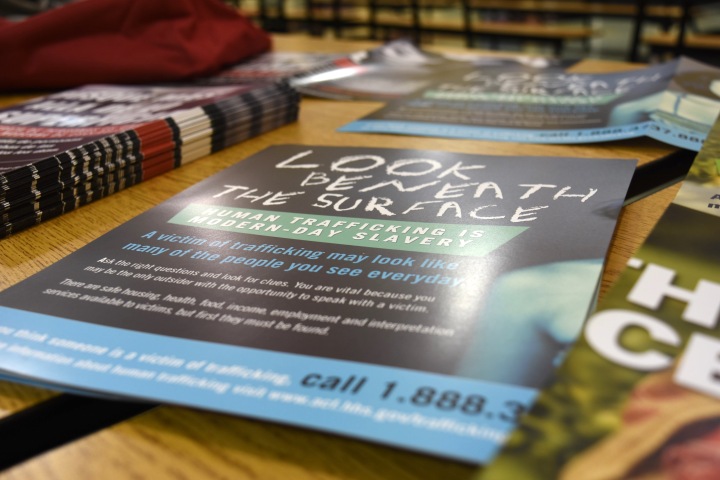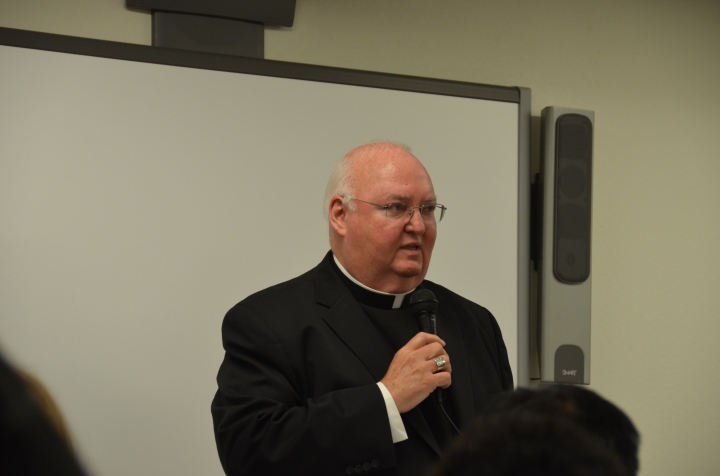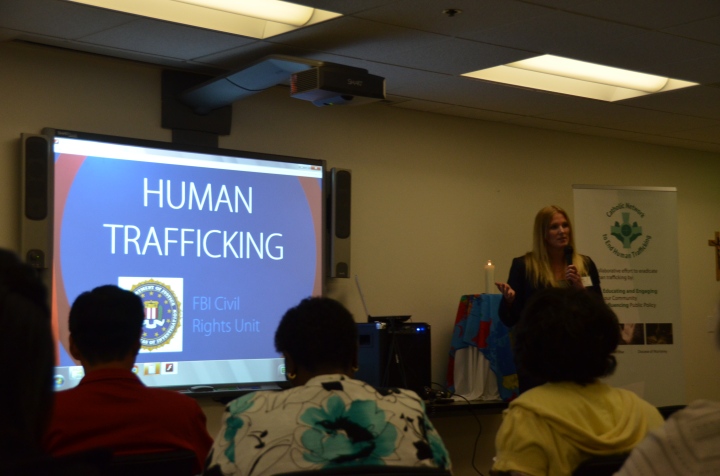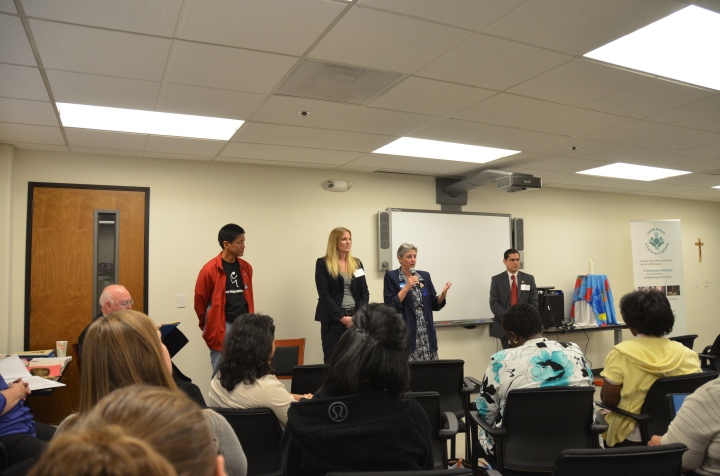Proposition 35: The CASE in Question
By Riya Dange, Nivedita Ahalwat, and Laura Galang
Archbishop Mitty High School
November 2, 2012
It was nearing midnight when she heard that fateful, yet not unexpected, knock on the front door. Her blood froze in her veins, and her skin began to prickle with fear. She made her way down the hallway into the kitchen, where her mother, startled by the sound of the knocking, had hastily laid down her cooking utensils. They gazed at each other for a moment, each seeking comfort in the other’s eyes but finding only her own fear reflected back at her. Instinctively, they moved closer together and embraced. “Hush, baby,” her mother whispered, kissing her softly on the head. “He won’t be able to get in this time. I’ve chained and bolted the door.” The girl nodded shakily, but her thundering heart reminded her that it could not possibly be so easy. Without warning, her eyes began to fill with tears. No, please, not again, she pleaded mentally. Suddenly, the sound of splintering wood shattered the silence of the house. As the heavy footsteps stomped closer and closer, her numb mind could fish out only three small words: back to hell.

The victim in the tragic tale above is a twelve year old girl who was forced into prostitution. Barely out of her childhood, this young adolescent, like so many others her age, is a part of the second largest and fastest growing criminal industry in the world: the human trafficking industry. Human trafficking, or modern-day slavery, is the transport of individuals from their home countries to new, unfamiliar places, which leaves them incredibly vulnerable. The aforementioned victim’s case, in particular, bears a strong resemblance to a 1994 case prosecuted by Nancy O’Malley, the Alameda County District Attorney. A little over two weeks ago, O’Malley listed this case as one of the primary reasons to vote in favor of the recently created Proposition 35.
What is Proposition 35?
First proposed by Daphne Phung, the leader of an anti-human trafficking group known as “California Against Slavery,” Proposition 35 intends to impose longer prison sentences and higher fines on human trafficking offenders. Instead of today’s normal sentences of three to five years for labor trafficking and four to eight years for the sex trafficking of a minor, Proposition 35 will mandate a prison term of up to 20 years for labor trafficking and 15 years to life for sex trafficking. Furthermore, the fine paid by offenders will be increased from $10,000, or three times the victim’s damages (whichever is greater), to $1.5 million in victim compensation. In addition, if the bill is passed, convicted human traffickers will be required to register as sex offenders and will be subject to monitoring in terms of Internet activity. The legislation does, however, include punishment for the actual prostitutes – that is, the victims of sex trafficking. Advocates of Proposition 35 argue that this serves as an effective way to separate the forced prostitutes from their abusive pimps, but opponents of the legislation insist that the victims ought to be given rehabilitation services instead of a prison sentence, considering the terrible ordeal that they have suffered through. Finally, the bill mandates training on human trafficking for all law enforcement officials, thereby raising awareness of and government agencies’ ability to combat the issue of human trafficking. In the time since it has been introduced, Proposition 35 – also known as the CASE (Californians Against Sexual Exploitation) Act – has stirred up much controversy among law enforcement officials, law professors, and average citizens alike.

October 23, 2012: Human Trafficking Panel Discussion at Stanford University
The two sides, pro and con, went head-to-head on Tuesday, October 23, when Helen Stacy, Director of the Program on Human Rights, hosted a panel discussion on Proposition 35 at Stanford University. Many distinguished and experienced law enforcement officials and scholars were present at the conference, including Alameda County District Attorney Nancy O’Malley, Loyola Law School professor Kathleen Kim, Daphne Phung (initiator of Proposition 35), retired police Lt. John Vanek, Asian Pacific Islander Legal Outreach staff attorney Cindy Liou, and Oakland police Sgt. Holly Joshi. Seven active members of the Mitty Advocacy Project, including ourselves, were witnesses to the passionate debate that raged back and forth for two hours, exposing us to both sides of the issue and providing everyone present with valuable information on Proposition 35.
The Controversy over Proposition 35
Proponents of the CASE Act, such as Nancy O’Malley, D.A., Sgt. Joshi, and, of course, Daphne Phung, argued passionately for the passage of Proposition 35. Nancy O’Malley praised the legislation as a way to raise awareness and societal disapproval of human trafficking, as well as a way to make a “strong statement.” This legislation provides a means by which law enforcement can gain some power over offenders, an invaluable asset that has been denied to government agencies for a long time. In addition, since human trafficking is a self-reported crime, greater awareness of this issue as a result of Proposition 35 would greatly increase the amount of injustice brought to light and the amount of victims that law enforcement officials are able to rescue from an abject life of abuse.
Daphne Phung emphasized the horror that each and every victim of human trafficking is put through. The CASE Act, she declared confidently, will hinder the expansion of the human trafficking industry in the state of California. Increased prison sentences and fines are intended to act as effective deterrents for any and all human trafficking offenders in the state of California.
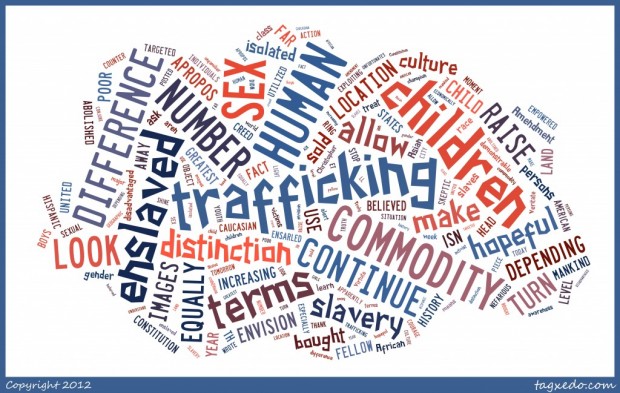
Sgt. Joshi closed off the proposition’s case with a stirring account of her experiences in the field, tending to victims of sex and labor trafficking. She especially stressed her support of the compulsory law enforcement training mandated by Proposition 35 as well as the requirement for all human trafficking offenders to register as sex offenders. This would allow law enforcement to track the pimps and ensure that they are not endangering the lives and safety of any more vulnerable men, women, and children. Certainly, the intentions of the bill are noble. However, the question remains: will Proposition 35 have the desired effect if passed?
The anti-Proposition 35 team, consisting of Professor Kathleen Kim, staffing attorney Cindy Liou, and former police Lt. John Vanek, responded with a fresh, entirely unexpected case. First, Professor Kim argued that the current anti-human trafficking legislation, AB-22, is sufficient in terms of combating the spread of human trafficking. She supported her claim with an example of a court case. Yousef, a native of Indonesia, was a victim of labor trafficking who finally took the initiative to sue his seller in American court. Although the court ruled in favor of Yousef, he was granted a compensation of only $13,000 – a meager sum that did not even come close to being a remedy for the abuse and suffering he had been put through. With AB-22 to back him up, he re-sued and received a larger, more sufficient jury award. Proposition 35 would eliminate this fall-back. Moreover, Professor Kim continued, the exorbitant fine of $1.5 million would deplete the convicted offender’s assets, leaving little to nothing for victim compensation. In the end, she concluded, Proposition 35 would cause greater harm to the same victims that it is intended to help.
Former Lt. John Vanek followed up with a dynamic speech about the questionable effectiveness of the bill at hand. He argued that increased prison sentences will not halt the spread of the human trafficking industry – far from it. “If raising sentences reduced crime,” he declared emphatically, “the drug industry would have died down long ago.” The fact is that many criminals do not think rationally; in other words, they are not able to weigh the causes and effects of their actions properly, as rational people do. Therefore, increasing punitive measures would have little to no effect in terms of deterring human trafficking. According to Vanek, a comprehensive piece of legislation to combat human trafficking would take into consideration the expertise of several law enforcement officials who are currently working against human trafficking. Proposition 35, however, would only make it more difficult for law enforcement officials to carry out offender prosecutions and victim rehabilitation. This is partly due to the overbroad, ambiguous, confusing nature of the bill. There are so many minute complexities in Proposition 35 that, Vanek joked, passage of the CASE Act would only lead to a game of “Whack-a-Mole” as law enforcement and the government scrambled to fix the bill. Perhaps this is why many influential coalitions have chosen not to support Proposition 35. The Coalition to Abolish Trafficking, L.A., is not endorsing the CASE Act, and the Polaris Project has chosen to make no statement about the proposed bill. Meanwhile, SAGE was an endorser of Proposition 35 – until October 22, 2012, the day before the conference was held. Vanek pointed to the many flaws in the legislation as the root cause of this joint disapproval. He finished by urging all present in the conference room to look more deeply into the bill and take note of its many flaws.
API Legal Outreach attorney Cindy Liou delivered the final blow to the proposition’s case. She raised several victim-centered concerns about the CASE Act, including the fact that the bill may not provide for victims as thoroughly as it seems to. First, Proposition 35 would punish the victims of human trafficking for the crime of prostitution, even if it was forced upon them. What victims really need, Liou argued passionately, is not a prison sentence but rehabilitation. Law enforcement and anti-human trafficking legislation ought to be focusing on empowering, rather than “rescuing,” victims of human trafficking, and the CASE Act quite simply does not meet those standards. Furthermore, the $1.5 million fine that Proposition 35 imposes upon convicted human traffickers will not be given to the actual victims. Instead, this money will be given to a larger organization known as a trust fund. Who knows if the money will ever reach the victims it was intended for? All in all, Proposition 35 seems to entail many more consequences than benefits for victims of human trafficking.
Summary of Points:
In Favor of Proposition 35
Against Proposition 35
Increases prison terms for traffickers
Requires convicted sex traffickers to register as sex offenders
Gives law enforcement the ability to monitor convicted human traffickers’ internet activities
Requires a $1.5 million from convicted human traffickers to pay for victim rehabilitation services
Mandates law enforcement training on human trafficking
Overbroad, ambiguous, and confusing
Will cause damage to the current legal processes for combating human trafficking
Does not focus primarily on the rehabilitation of the victim but rather on the punishment of the perpetrator
The $1.5 million does not go directly to the victims of human trafficking
The Verdict: Vote No on Proposition 35
When we walked into the conference room that evening, we were completely in favor of Proposition 35. A bill that raised awareness about a heinous crime, increased the punishment on offenders, and served as a deterrent to human traffickers across California? It had to be good. In fact, when the session commenced, many of us must have wondered if it was even possible to argue against such a noble and reasonable bill. However, as the panel discussion progressed, we began to see the glaring flaws present in Proposition 35 and realized that it may not be as “noble and reasonable” as it had originally seemed. As the case against the CASE Act gradually unraveled before our eyes, we were forced to come to the conclusion that Proposition 35 is not, after all, the panacea to our human trafficking problem. If anything, the passage of Proposition 35 will only make matters worse.
How much worse can they possibly become? you may ask. The fact is, human trafficking is an enormous industry and growing fast. For instance, the Council of Europe estimates that human trafficking generates over $42 billion every year in the United States alone, and, according to the U.S. State Department, over 820,000 men, women, and children are trafficked worldwide every year. 80% are women and girls, and 50% are minors. Whether you are a Democrat or Republican, an Independent or a member of the Green Party, we share a common ambition in halting the spread of human trafficking. It is all too clear that we must band together to put an end to this despicable crime against human beings. However, Proposition 35 is not the solution.
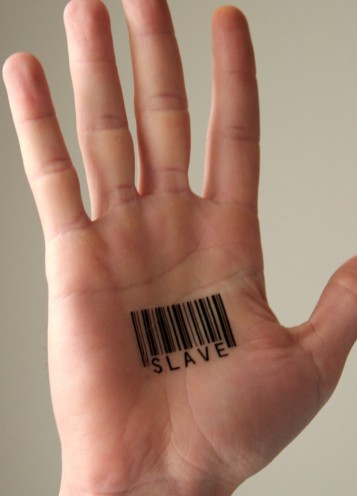
Sex trafficking and forced labor is a complicated issue, and so is Proposition 35. Those who are unaware of the specifics of the bill would not realize its actual, negative impact and so would simply vote for the legislation on the basis of its “preventive” measures, just to make themselves feel as if they are truly contributing to the cause. However, as voters, we must look deeper into the legislation and consider how effective Proposition 35 would be if implemented. Even though the bill is well-intentioned, it will not deter the spread of human trafficking in the slightest. If anything, the CASE Act would create more difficulties for the victims of human trafficking, the very people whom it strives to protect. Therefore, we feel that it is our moral duty to leave you with the following, emphatic message: vote no on Proposition 35.

